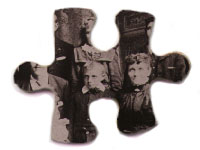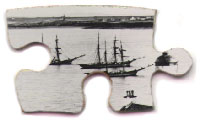



Caithness Archives
"Bobs" and his Caithness Honour Guard,1895
At the time of his visit to Ackergill Tower in 1895, Lord Roberts - "Bobs" as he was affectionately known - was unquestionably the most popular British soldier of his day, and the men chosen as his Honour Guard were indeed privileged to attend him. Lord Roberts is a subject in his own right and, except to relate that the great soldier was taught the art of riding a bicycle on the long avenue leading to Ackergill Tower, he can be safely consigned to the pages of the many Victorian military histories. The Field-Marshal's Honour Guard, however, contained a few figures whose history may not be without interest to readers.
The backbone of the Honour Guard consisted of Veterans of the old Highland regiments who fought in the Crimea and in India during the Mutiny, soldiers who stood in the "Thin Red Line" at Balaclava, defying the Russian cavalry, though greatly outnumbered, or fought and force-marched across baking-hot India in uniforms more suited to a Scottish autumn, to relieve the besieged garrison at Lucknow, where the Highlanders won six V.C.s in one morning before breakfast. Such a man was Sergeant Coull of Thrumster, whose wife Betty accompanied him to the Crimea with the 93rd Highlanders in 1854. Sergeant Coull had merely the shared glory of being in the ranks of the "Thin Red Line": to his wife belongs a much more singular honour.
In those days Field Hospitals were barbaric places. Battlefield surgery was still in its infancy, and operations required strong constitutions of both patients and surgeons. Anaesthetic seems only to have been administered in extreme cases, the best thing for the patient was probably to swoon unconcious through fear or loss of blood.
Betty Coull was, apparently, employed to administer anaesthetic. Her method was quite simple: a couple of musket balls in an old stocking, and a strong, swift right arm. On the very day the 'Thin Red Line' stood firm against the Russian cavalry, Britain's Turkish allies were in full flight, their defences having been overrun by the Russians. The Turks' line of flight took them into the vicinity of the camp of the 93rd. A contemporary historian describes what then happened: "There came out from the camp of the Highland regiment a stalwart and angry Scotch wife, with an uplifted stick in her hand . . . the blows of this Christian woman fell thick on the backs of the Faithful. She believed, it seems, that besides being guilty of running away, the Turks meant to pillage her camp, and the blows she delivered were not mere expressions of scorn, but actual and fierce punishment. In one instance she laid hold of a strong-looking burly Turk and held him fast until she had beaten him for some time, and seemingly with great fury. She also applied much invective. Notwithstanding graver claims upon their attention, the men of the 93rd were able to witness this incident. It mightily pleased and amused them. This angry Scotch wife was Betty Coull.
A relic of Sergeant Instructor George Sorrie, a skean dubh won by him in 1877 for rifle shooting, is on display in the Thurso Museum, and his name figures in the list of exhibitors at the great Exhibition of Art & Industry, held in Thurso in 1876. Sergeant Sorrie taught drill to the Thurso Company of the Rifle Volunteers, the fore-runners of the famous Seaforth Highlanders
A manuscript memoir of Robert Galleitch, written at the time of his death is,perhaps, the most interesting item associated with the soldiers of the Honour Guard and deserves to be preserved. The circumstances which led to Roberts's birth are romantic indeed. His parents were born in England, his father being a sailor in the King's Navy, his mother apparently coming from a somewhat higher social class, and being promised in marriage to an elderly man of ample means who she did not care for. In those days parents seldom heeded the wishes of their children, more so when the chance of marriage into easy circumstances was concerned, so perhaps the refusal for a daughter to wed a lowly sailor in preference to a wealthy old gentleman can be easily understood. The young couple did the sensible thing - they ran away to Gretna Green and were there married by the Blacksmith. An excellent start; but it didn't last long. Seaman Galleitch lost one of his legs in a skirmish off the Spanish coast and was invalided out of the Service with a small pension, sufficient for the couple to take a croft at Swordale, in Caithness. On this croft were born two sons and three daughters.
Robert Galleitch was barely 17 when, in company with two Munro brothers from Halkirk, he enlisted in the 93rd Highlanders. It was 1850. From Thurso they were marched to Fort George, there to undergo nine months of rigorous training prior to joining the Regiment at Glasgow, where the 93rd was stationed for the next 12 months. Further home postings were Weedon, Portsmouth, and Devenport. During this period of peacetime soldiering, Private Galleitch availed himself of what educational facilities were then open to soldiers, attaining a high standard. He was also pleased to meet his younger brother, William, who had enlisted in the 93rd in 1852.
On the 27th March, 1854, the 93rd embarked on the AHimalaya@ for the Crimea. Britain, with its allies France and Turkey, was at war with Russia. Arriving at their destination in the second week of September, the 93rd, despite misgivings over their lack of battle-readiness, found themselves almost immediately in the thick of the fighting at Alma, in the front line between their Highland Brigade cousins, the 42nd and the 76th regiments. The Galleitch brothers stood alongside one another. As the British infantry advanced across the river, a young officer of the 93rd, Lieutenant McBean, was thrown from his horse and would have certainly drowned but for the prompt action of Robert Galleitch, who with no thought for his own safety, managed to cut the officer free from his horse, and pull him to the river bank. Lieutenant McBean went on to become Commander of the Regiment, retiring at the age of 60 with the rank of General. ABalaclava@ is one of the proudest Battle Honours of the 93rd. Three famous actions are associated with Balaclava: the charge of the Heavy Cavalry Brigade, 800 troopers against 3000 Russian cavalry; the Charge of the Light Brigade, that immortal monument to heroism and strategic stupidity; and "The Thin Red Line", where the heavily outnumbered infantry of the 93rd, - who had been chosen by lot to garrison the camp at Balaclava - formed up in two lines, 650 men under their General, Colin Campbell, to successfully defy 4 squadrons of Russian cavalry. The brothers Galleitch, along with Sergeant Coull, of Thrumster, were part of this line, who had vowed with Colin Campbell to die where they stood. Iron discipline and two volleys of superb musketry discomfited the Russian horsemen who galloped off in full retreat, having got no closer than 150 yards to the Highland line.
The Crimean conflict now stagnated into a protracted seige of Sebastopol, a war of attrition, ancestor of those frustrating trench struggles of 1914-18.
On the 8th September, 1855, Colin Campbell's Highland Brigade were ordered to prepare for an assault on the Redan, the great fortress defence of Sebastopol. Shortly after midnight Lieutenant McBean made a routine patrol of the front line trenches before the Redan. Struck by the prevailing silence, he decided to enter the great fort. Ten soldiers of the 93rd volunteered to accompany him. The brothers Galleitch were among those volunteers. Inside the Redan they found only the dead and the dying. The Russians had evacuated Sebastopol. The war dragged on until March, 1856, when peace was declared, and the British Army returned home.
Robert Galleitch came back to Caithness where he took up farm service, marrying the cousin of D.L.Moody, a noted evangelist, shortly after. A staunch supporter of the Free Church, a keen debater with an easy, engaging delivery, Radical in his political opinions, Robert Galleitch was a popular member of his local community. He died in 1908, aged 75, survived by a son and three daughters.
William Galleitch continued his service with the 93rd Highlanders until 1873, before emigrating to America to open a business in Chicago.
Steven Cashmore 1998
![]()
Information contained on this page may only be used for personal use,any request for
full or part publication must be carried out through the Highland archive.
Send information for these archives to william@caithnessarchives.org.uk